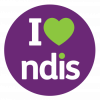 At Ability Action Australia, if there’s any way we can take some of the pressure off NDIS participants and their families, we’re up for it.
At Ability Action Australia, if there’s any way we can take some of the pressure off NDIS participants and their families, we’re up for it.
One of the ways we do this is through our multidisciplinary team approach, which allows you to access a variety of services through one single provider.
This approach not only simplifies your entire NDIS experience, so you don’t have to be caught in an endless loop of paperwork, but also achieves better outcomes for you or your loved one.
The multidisciplinary team
Multidisciplinary care is when a team of health professionals with different skills collaborate to support as many of your needs as possible. This care can be delivered under one organisational umbrella, or by professionals from a range of different organisations.
At Ability Action Australia, our multidisciplinary teams are made up of allied health professionals who meet on a regular basis. During these meetings, they discuss a participant’s needs, set goals, report on assessment results and intervention outcomes, solve problems, and work out the best way to treat each participant. The participant, their family and support workers are actively involved in all discussions about their treatment.
This means:
- Your individual needs and goals are the central focus
- You access a variety of services through one provider
- Supports may include Occupational Therapy, Speech Pathology, Exercise Physiology, Physiotherapy, and more NDIS support services
- We treat as many of your needs as possible in a holistic way
- We collaborate on the best ways to support you
- Over time your team may change to reflect your changing needs
How a team-based service benefits you
A team-based service where professionals with different perspectives collaborate to provide life-changing support is especially important for people living with disability who have complex needs that require multiple interventions.
The benefits of a multidisciplinary team include:
1) A simpler process:
If you’ve received funding for multiple services as part of your NDIS plan, the prospect of navigating the many service providers available can be daunting, to say the least. You’ll face a multitude of phone calls, forms, appointments, and the need to repeat your story to different allied health clinicians.
At Ability Action Australia, our team can help you access multiple services in a streamlined way, helping you to save time and paperwork. For instance, we can provide many types of supports all covered by one single service agreement. But if you choose different providers for each of your supports, you will need a service agreement for each provider you choose. This can end up being difficult to manage and more costly.
If you require a variety of supports, we can also help you access them quickly and conveniently, because we have access to a large pool of fully mobile allied health professionals across Australia. This means avoiding the waiting lists of different providers, avoiding the stress of choosing a quality provider from each allied health sector, and putting your plan into action faster.
2) Better outcomes
Our clinicians continually report better outcomes for NDIS participants with complex needs when they get help and support from a multidisciplinary team.
These outcomes include more holistic care, where our team of experts collaborate and share information to understand the participant holistically. This can produce positive results and assist you to achieve your NDIS goals. Even if a participant starts their journey with us with a single therapist, we focus on the health of the entire body and mind and will recommend other disciplines if we feel the participant could benefit from them. We believe the right team around the participant can mean more effective therapy and more positive outcomes.
There is also greater involvement from the participant, and their family or support workers, in decisions about care. This is because teamwork involves strong communication and information sharing across our team and the participant. Our multidisciplinary teams bridge the gap between us and our participants by combining everyone’s knowledge and skills to help participants achieve excellent outcomes.
Teamwork in action
Here are a couple of recent examples of ways in which our multidisciplinary teams have supported great outcomes for our participants.
- One of our participants is a 14-year-old boy living with autism spectrum disorder, attention deficit hyperactivity disorder, and oppositional defiance disorder. He is working with one of our registered clinical Exercise Physiologists who is also working closely with one of our Occupational Therapists (and his school teachers) to come up with classroom strategies for preventing concerning behaviours such as aggression when he becomes frustrated. Since conducting exercise sessions at the school, this participant has been able to improve his focus in the classroom and the teacher has reported fewer negative behaviours after exercise sessions.
- Another participant is a 51-year-old male living with spina bifida, schizophrenia and chronic pain. After an initial assessment with our Exercise Physiologist, this participant was found to have fear avoidance (where a person develops and maintains chronic musculoskeletal pain as a result of avoidant behaviour based on pain-related fear). This was particularly the case when performing basic movements such as getting up from a chair, walking around the home, bending down and other daily tasks. All of these tasks caused him significant pain.Our Exercise Physiologist brought in and has worked closely with our Occupational Therapist who has provided specialised education around pain and mindfulness. At the same time, the Exercise Physiologist was able to supplement this by gradually re-introducing basic movements and ensuring that positive reinforcement was used to change this participant’s mindset around ‘this movement is going to cause me too much pain’. Upon re-assessment, our participant has now reduced his pain reporting and effectively doubled his walking assessments, which means his mobility has increased. This has vastly improved his enjoyment of daily life and his community integration.
Talk to us
For details about accessing Ability Action Australia’s NDIS services or to understand how a multidisciplinary team can help you reach your goals, please contact us on 1800 238 958 or email hello@abilityactionaustralia.com.au.

